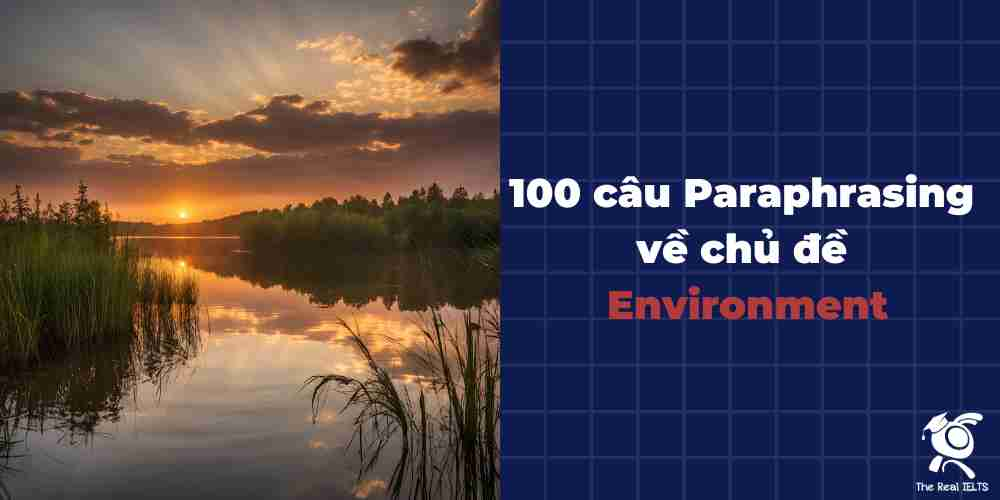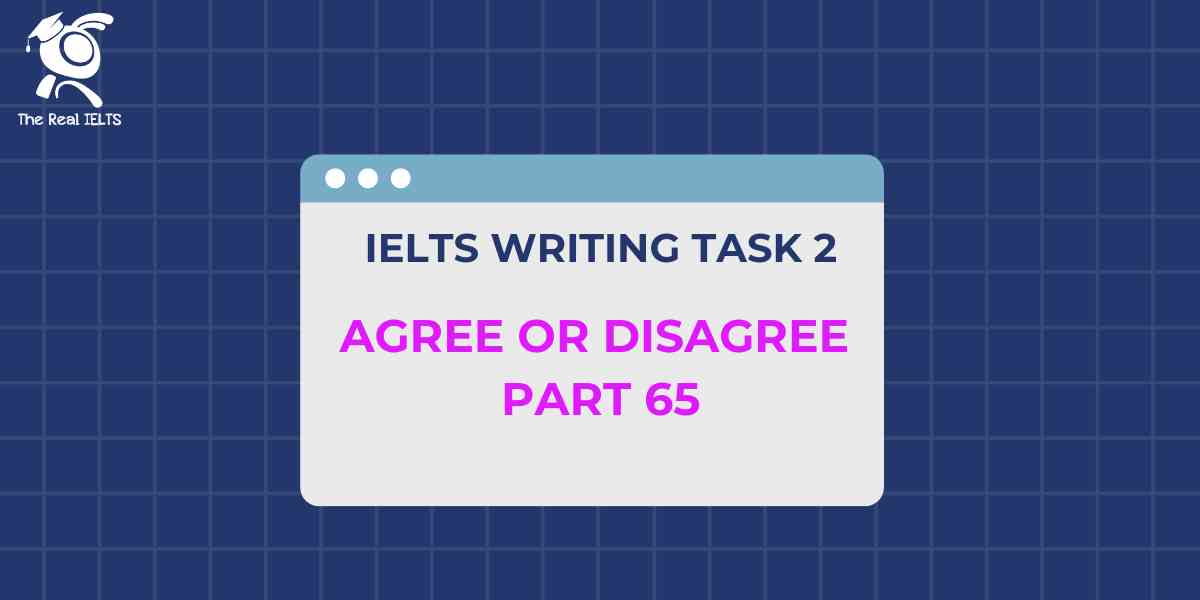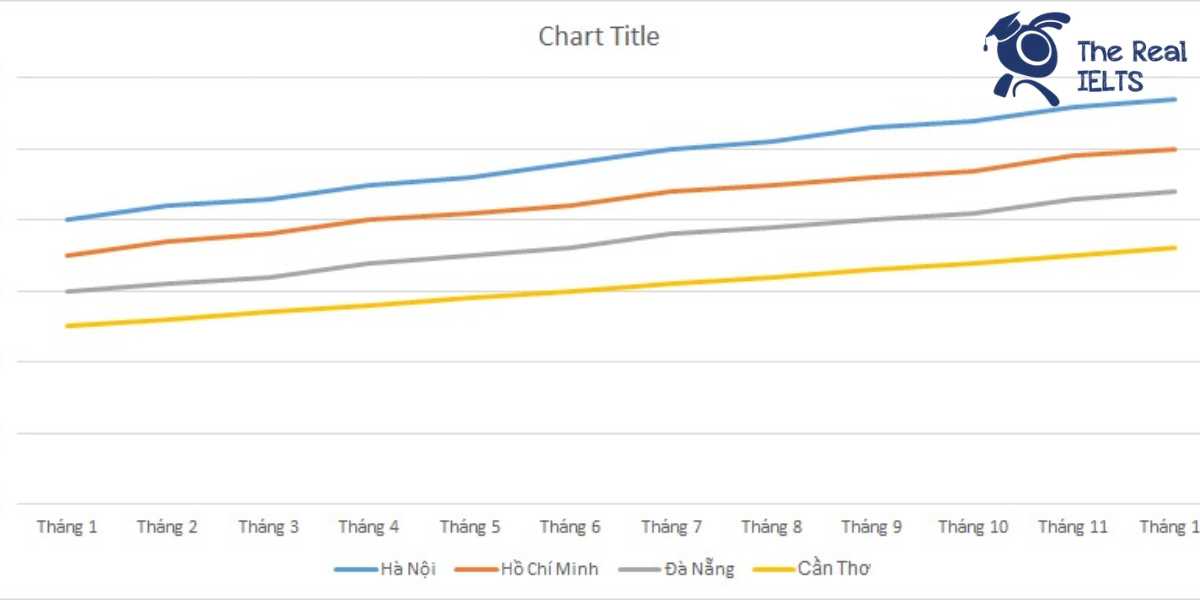“100 câu Paraphrasing về chủ đề Environment trong tiếng Anh” là tài liệu hữu ích giúp bạn nâng cao kỹ năng viết và giao tiếp trong công việc. Nó cũng là một cách luyện thi IELTS phần Writing.
Học lại bài cũ: 100 câu Paraphrasing về chủ đề Health trong tiếng Anh.
Cấu trúc đồng nghĩa và từ đồng nghĩa Paraphrasing về chủ đề Health
| English Phrase | Vietnamese Translation |
|---|---|
| Protecting | Bảo vệ |
| Safeguarding | Bảo vệ, giữ gìn |
| Preserving | Bảo tồn |
| Conserving | Bảo vệ, giữ gìn |
| Guarding | Bảo vệ |
| Well-being | Sức khỏe |
| Balanced | Cân bằng |
| Stability | Ổn định |
| Reducing | Giảm bớt |
| Minimizing | Giảm thiểu |
| Waste reduction | Giảm thiểu chất thải |
| Endanger | Gây nguy hại |
| Threatens | Đe dọa |
| Clean energy | Năng lượng sạch |
| Renewable energy | Năng lượng tái tạo |
| Sustainability | Bền vững |
| Carbon footprint | Lượng khí thải carbon |
| Renewable resources | Tài nguyên tái tạo |
| Climate action | Hành động vì khí hậu |
| Environmental conservation | Bảo vệ môi trường |
| Resource management | Quản lý tài nguyên |
| Preservation | Bảo tồn |
| Emissions regulations | Quy định về khí thải |
| Conservation | Sự bảo tồn |
| Green energy | Năng lượng xanh |
| Clean air | Không khí sạch |
| Marine life | Sinh vật biển |
| Ecosystem | Hệ sinh thái |
| Endangered species | Loài có nguy cơ tuyệt chủng |
| Water pollution | Ô nhiễm nước |
| Urban planning | Quy hoạch đô thị |
| Responsible consumerism | Tiêu dùng có trách nhiệm |
| Pollution control | Kiểm soát ô nhiễm |
| Freshwater resources | Tài nguyên nước ngọt |
| Biodiversity | Đa dạng sinh học |
| Soil erosion | Xói mòn đất |
| Aquatic life | Sinh vật dưới nước |
| Finite | Có hạn |
| Global cooperation | Hợp tác toàn cầu |
| Nature conservation | Bảo tồn thiên nhiên |
| Protecting wildlife | Bảo vệ động vật hoang dã |
| Safeguarding nature | Bảo vệ thiên nhiên |
| Efficient energy use | Sử dụng năng lượng hiệu quả |
| Waste minimization | Giảm thiểu rác thải |
| Emissions standards | Tiêu chuẩn khí thải |
| Resource conservation | Bảo tồn tài nguyên |
| Environmental responsibility | Trách nhiệm với môi trường |
| Environmental sustainability | Sự bền vững của môi trường |
| Freshwater conservation | Bảo vệ nguồn nước ngọt |
| Air quality | Chất lượng không khí |
| Human impact | Tác động của con người |
| Environmental degradation | Suy thoái môi trường |
| Natural habitats | Môi trường sống tự nhiên |
| Plastic usage | Sử dụng nhựa |
| Biodiversity protection | Bảo vệ đa dạng sinh học |
| Overpopulation | Dân số quá đông |
| Water conservation | Bảo tồn nguồn nước |
| Sustainable development | Phát triển bền vững |
| Balanced environment | Môi trường cân bằng |
| Global warming | Hiện tượng nóng lên toàn cầu |
| Preserving natural landscapes | Bảo tồn cảnh quan thiên nhiên |
| Protecting natural ecosystems | Bảo vệ các hệ sinh thái tự nhiên |
| Clean water | Nước sạch |
| Protecting endangered species | Bảo vệ các loài có nguy cơ tuyệt chủng |
| Reducing consumption | Giảm tiêu thụ |
| Emissions control | Kiểm soát lượng khí thải |
| Fossil fuel reliance | Phụ thuộc vào nhiên liệu hóa thạch |
| Livable future | Tương lai đáng sống |
| Resource depletion | Cạn kiệt tài nguyên |
| Sustainable cities | Thành phố bền vững |
| Environmental policies | Chính sách môi trường |
| Responsible consumption | Tiêu thụ có trách nhiệm |
| Natural resources | Tài nguyên thiên nhiên |
| Overfishing | Khai thác cá quá mức |
| Climate system | Hệ thống khí hậu |
| Planting trees | Trồng cây |
| Recycling | Tái chế |
| Carbon emissions | Khí thải carbon |
| Wildlife habitats | Môi trường sống của động vật hoang dã |
| Environmental awareness | Nhận thức về môi trường |
| Urban ecosystem | Hệ sinh thái đô thị |
| Sustainability initiatives | Sáng kiến bền vững |
| Energy efficiency | Hiệu quả năng lượng |
| Global environmental health | Sức khỏe môi trường toàn cầu |
| Natural balance | Cân bằng tự nhiên |
| Green living | Lối sống xanh |
| Clean environment | Môi trường sạch |
| Emission reduction | Giảm thiểu khí thải |
| Sustainable lifestyle | Lối sống bền vững |
| Pollution prevention | Ngăn ngừa ô nhiễm |
| Resource efficiency | Hiệu quả tài nguyên |
| Natural equilibrium | Cân bằng tự nhiên |
100 câu Paraphrasing về chủ đề Health
- Environmental protection is crucial for future generations.
- Preserving nature is essential for sustainable development.
- We must protect the Earth’s ecosystems for lasting growth.
- Safeguarding our environment ensures a better tomorrow.
- Caring for the environment is key to human survival.
- Future prosperity depends on environmental conservation.
- A healthy ecosystem benefits all living beings.
- Sustainable practices protect our natural resources.
- Every action impacts the environment positively or negatively.
- Conservation today shapes a livable world tomorrow.
- Humans are responsible for the planet’s well-being.
- Biodiversity is essential for ecosystem stability.
- Waste reduction helps combat environmental degradation.
- We must reduce pollution to save the planet.
- Global warming poses a serious threat to humanity.
- Carbon emissions harm both humans and wildlife.
- Renewable energy is the future of sustainability.
- Climate change impacts all aspects of life.
- Water conservation preserves a precious resource.
- Recycling reduces waste and conserves resources.
- Nature’s balance is vital for life on Earth.
- Clean air is a basic human right.
- Sustainable agriculture supports healthy soil.
- Oceans are crucial for the Earth’s climate system.
- Forests act as Earth’s lungs, absorbing carbon dioxide.
- Deforestation leads to loss of species and habitats.
- We must protect endangered species from extinction.
- Pollution control is essential for a healthy environment.
- Green energy reduces our carbon footprint.
- Environmental awareness promotes positive change.
- Climate action is necessary for a secure future.
- Reducing plastic usage lessens environmental impact.
- Clean energy promotes a healthy environment.
- Overpopulation strains Earth’s resources.
- Urban planning should consider environmental impact.
- Ecosystems need preservation for life continuity.
- Our choices shape Earth’s future.
- Resource conservation is crucial for sustainable growth.
- Eco-friendly practices reduce environmental harm.
- A balanced environment ensures human health.
- Environmental policies shape the future of our planet.
- Sustainability begins with responsible consumption.
- Energy efficiency reduces environmental strain.
- Marine life is threatened by pollution and overfishing.
- Protecting natural habitats supports biodiversity.
- Freshwater resources are limited and need preservation.
- Earth’s resources are finite and require careful management.
- Wildlife conservation is key to ecosystem health.
- Human activities affect Earth’s climate patterns.
- Environmental protection demands global cooperation.
- Sustainable transport reduces carbon emissions.
- Air pollution is a major health hazard.
- Solar power is a sustainable energy source.
- Planting trees combats carbon emissions.
- We must address the root causes of pollution.
- Natural resources should be used mindfully.
- Environmental sustainability is a shared responsibility.
- Reducing consumption minimizes waste.
- Sustainable development balances economy and ecology.
- Recycling helps reduce landfills.
- Preserving natural landscapes benefits humanity.
- Water pollution harms aquatic life and ecosystems.
- Protecting forests ensures a cleaner atmosphere.
- Proper waste management prevents environmental contamination.
- Emissions regulations protect air quality.
- Ecosystems adapt, but rapid change can be harmful.
- Clean water is essential for health and survival.
- Wildlife habitats are diminishing due to human expansion.
- Every individual can make an environmental difference.
- Nature conservation is vital for biodiversity.
- Overfishing threatens marine biodiversity.
- Global warming affects all forms of life.
- Transitioning to green energy reduces fossil fuel reliance.
- Human impact on Earth must be minimized.
- The preservation of natural parks is essential.
- Recycling reduces environmental pollution.
- Protecting wildlife benefits the whole ecosystem.
- Sustainable farming practices prevent soil erosion.
- Healthy forests are essential for life.
- Responsible consumerism supports environmental health.
- Renewable resources ensure a sustainable future.
- Waste reduction is crucial for a clean planet.
- Conservation preserves Earth’s beauty.
- Sustainable cities reduce carbon emissions.
- Global collaboration is key for environmental progress.
- Renewable energy minimizes greenhouse gases.
- Conserving biodiversity maintains ecosystem balance.
- Climate action supports a livable future.
- Carbon footprints should be minimized for sustainability.
- Protecting oceans supports Earth’s climate.
- Efficient energy use reduces environmental impact.
- Sustainable living benefits future generations.
- Nature provides essential resources for life.
- Environmental responsibility promotes global health.
- Green policies lead to eco-friendly communities.
- Healthy soil is fundamental for agriculture.
- Reducing fossil fuel use combats climate change.
- Recycling is an easy way to support the planet.
- Protecting ecosystems prevents species loss.
- Green living starts with small daily choices.
Đáp án viết lại câu
- Protecting the environment is crucial for future generations.
- Safeguarding nature is essential for sustainable development.
- We must conserve the Earth’s ecosystems for lasting growth.
- Guarding our environment ensures a better tomorrow.
- Preserving the environment is key to human survival.
- Future sustainability depends on environmental conservation.
- A balanced ecosystem benefits all living beings.
- Sustainable habits protect our natural resources.
- Every decision impacts the environment positively or negatively.
- Protecting nature today shapes a livable world tomorrow.
- Humans hold responsibility for the planet’s well-being.
- Diverse biodiversity is essential for ecosystem stability.
- Waste minimization helps combat environmental degradation.
- We must control pollution to save the planet.
- Global warming threatens humanity seriously.
- Carbon emissions endanger both humans and wildlife.
- Clean energy is the future of sustainability.
- Changing climates impact all aspects of life.
- Water preservation conserves a precious resource.
- Repurposing reduces waste and conserves resources.
- Nature’s equilibrium is vital for life on Earth.
- Clean air should be a basic human right.
- Sustainable farming supports healthy soil.
- Oceans are vital for Earth’s climate system.
- Forests absorb carbon dioxide, acting as Earth’s lungs.
- Deforestation harms species and habitats.
- We must protect rare species from extinction.
- Pollution control contributes to a healthy environment.
- Green energy lowers our carbon footprint.
- Environmental education promotes positive change.
- Climate action is imperative for a secure future.
- Reducing plastics lessens environmental impact.
- Clean energy enhances a healthy environment.
- Overpopulation depletes Earth’s resources.
- Urban planning should respect environmental impact.
- Ecosystems require preservation for life continuity.
- Our decisions shape Earth’s future.
- Resource management is crucial for sustainable growth.
- Eco-friendly habits reduce environmental harm.
- A balanced environment promotes human health.
- Environmental legislation shapes the future of our planet.
- Sustainability starts with responsible consumption.
- Energy conservation reduces environmental strain.
- Marine life is at risk due to pollution and overfishing.
- Protecting natural ecosystems supports biodiversity.
- Freshwater resources are scarce and need preservation.
- Earth’s resources are limited and require careful management.
- Wildlife protection is key to ecosystem health.
- Human activities affect Earth’s climate patterns.
- Environmental protection requires global cooperation.
- Sustainable transport cuts carbon emissions.
- Air pollution is a serious health hazard.
- Solar power provides a sustainable energy source.
- Planting trees reduces carbon emissions.
- We must address the root causes of pollution.
- Natural resources should be conserved mindfully.
- Environmental sustainability demands shared responsibility.
- Reducing usage minimizes waste.
- Sustainable development balances economy and ecology.
- Recycling decreases landfills.
- Preserving natural regions benefits humanity.
- Water pollution destroys aquatic life and ecosystems.
- Protecting forests ensures a cleaner atmosphere.
- Proper waste management stops environmental contamination.
- Emissions standards protect air quality.
- Ecosystems adapt gradually, but rapid change can be harmful.
- Clean water is vital for health and survival.
- Wildlife areas are diminishing due to human expansion.
- Every individual can contribute to environmental improvement.
- Nature conservation is essential for biodiversity.
- Overfishing endangers marine biodiversity.
- Global warming affects all forms of life.
- Transitioning to green energy limits fossil fuel reliance.
- Human impact on Earth should be minimized.
- The preservation of natural sanctuaries is essential.
- Recycling curbs environmental pollution.
- Protecting wildlife enhances the ecosystem.
- Sustainable farming reduces soil erosion.
- Healthy forests support all life.
- Responsible consumerism encourages environmental health.
- Renewable resources ensure a sustainable future.
- Waste minimization is crucial for a clean planet.
- Conservation maintains Earth’s beauty.
- Sustainable cities cut down on carbon emissions.
- Global collaboration is vital for environmental progress.
- Renewable energy lowers greenhouse gases.
- Conserving biodiversity preserves ecosystem balance.
- Climate action creates a livable future.
- Carbon footprints should be reduced for sustainability.
- Protecting oceans supports Earth’s climate.
- Efficient energy use lightens environmental impact.
- Sustainable living benefits future generations.
- Nature provides essential resources for life.
- Environmental responsibility fosters global health.
- Green policies cultivate eco-friendly communities.
- Healthy soil is key for agriculture.
- Reducing fossil fuel use fights climate change.
- Recycling is an easy method to support the planet.
- Protecting ecosystems prevents species loss.
- Green living begins with small daily choices.















